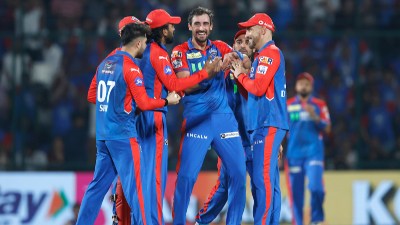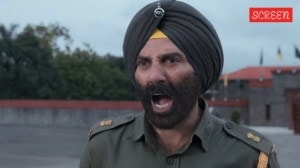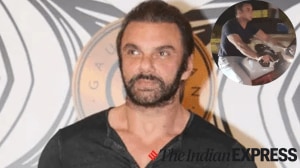Behind Tamil Nadu vs Centre over NEET, a larger equity & federalism battle
NEET has been conducted since 2013. The strong political opposition to the exam was triggered by the suicide, in 2017, of Anitha, a 17-year-old Dalit girl who was a school topper but had been unable to clear NEET.
 Aspiring students and parents ahead of NEET exam at a center in New Delhi on Sunday, May 07, 2023. (Express photo by Abhinav Saha)
Aspiring students and parents ahead of NEET exam at a center in New Delhi on Sunday, May 07, 2023. (Express photo by Abhinav Saha) The ongoing tussle between Tamil Nadu and the Centre over the National Eligibility and Entrance Test (NEET) for admission to undergraduate medical courses escalated dramatically after a 48-year-old single parent was found dead at his home outside Chennai, two days after his 19-year-old son, Jagadeeswaran, died by suicide after failing the exam twice.
Jagadeeswaran killed himself on Saturday, the same day that state Governor R N Ravi, who has been steadfastly opposed to legislative attempts to take Tamil Nadu out of the ambit of the all-India entrance exam, said he would “never, ever” assent to the anti-NEET Bill passed by the Assembly.
NEET has been conducted since 2013. The strong political opposition to the exam was triggered by the suicide, in 2017, of Anitha, a 17-year-old Dalit girl who was a school topper but had been unable to clear NEET.
Why does Tamil Nadu oppose NEET?
Critics argue that NEET’s mechanical focus on marks disregards the importance of student quality and aptitude. It has disrupted admired education models like that of Christian Medical College (CMC) Vellore, which emphasised aptitude over marks.
The introduction of NEET has also dismantled the state’s in-service quota for medical graduates in the government sector, which, according to critics, has undermined quality healthcare.
Why is this such an emotive issue?
The demand for educational autonomy has fused into strongly held notions of social justice, and the struggle for the preservation of local values against centralised control. The opposition to NEET has been situated in the demand for equity in education.
Tamil Nadu’s vision for education was shaped by Chief Minister K Kamaraj (1954-63), who initiated critical reforms such as having “a primary school every 3 km, a high school every five km”. A verified anecdote about Kamaraj has it that he once took only a few minutes to pick 10 candidates from a large bundle of applications for admissions under the CM’s quota.
Asked by his secretary how he could make his choice in such a short time, Kamaraj said he had picked the applications in which the parents had put thumb impressions in place of signatures. His decision is seen as embodying a deep empathy for the unlettered masses, and a reflection of his understanding of human potential and aptitude.
How has Tamil Nadu’s opposition played out in the legislative sphere?
The previous AIADMK regime brought two Bills — The Tamil Nadu Admission to MBBS and BDS Courses Bill 2017, and The Tamil Nadu Admission to Postgraduate Courses in Medicine and Dentistry Bill, 2017 — that sought state autonomy in medical admissions, focusing on board examination scores for UG courses and undergraduate marks for PG courses. The Bills were returned by the President in September 2017.
In September 2021, months after M K Stalin became Chief Minister, the Tamil Nadu Assembly passed with the support of all parties (the BJP walked out), The Tamil Nadu Admission to Undergraduate Medical Degree Courses Bill, 2021, to dispense with NEET and allow admission to medical courses based on Class 12 marks to “ensure social justice”.
The Bill said NEET fosters inequity and benefits affluent candidates who can afford special coaching, while raising entry barriers for the underprivileged. It said the state was the competent authority to regulate admissions for underprivileged social groups, as medical courses were traceable to the provisions of the Constitution.
Governor Ravi sat on the Bill till the beginning of February 2022 before returning it to the government. The Assembly readopted the Bill within days, and the Governor subsequently told the CM that it would be forwarded to the President. The Bill remains pending with Rashtrapati Bhavan.
Stalin has accused Ravi of failing to discharge his constitutional duty, and criticised his blocking of the Bill as an attack on the powers of the state, and the principles of federalism and democracy. Ravi has called the proposed legislation “anti-poor” and against the interests of rural and economically disadvantaged students, and cited a Supreme Court decision that upheld NEET.
What was the basis of the anti-NEET Bill?
In June 2021, Stalin’s government appointed the Justice A K Rajan Committee to examine whether NEET was an equitable method to select candidates for admission to medical courses.
The Committee, which submitted its report in September that year, was critical of NEET, and said that it undermined societal diversity and favoured the affluent in medical education. It recommended immediate steps to eliminate it through the passage of suitable legislation.
The Committee’s report, ‘Impact of NEET on Medical Admissions in Tamil Nadu’, concluded that the examination disproportionately benefited repeaters (71% in 2021) and coached students (99% in 2020), and discriminated against first-time applicants. It noted a 50% decline in seat share in backward districts like Ariyalur and Perambalur after the introduction of NEET, and an increased representation from urban centres such as Chennai.
Admissions fell among first-generation graduates, rural applicants, and candidates with small parental incomes, the report said.
Where do things stand now?
Tamil Nadu is known for several pioneering public health practices and policies, and its public health infrastructure is among the best in the country. Tamil Nadu’s health indices were attributed to the earlier system that retained PG doctors.
The stalemate over NEET captures the struggle to balance uniformity and fairness with specific needs and values of a diverse society. It also illustrates the larger clash between central standardisation and local autonomy, and reflects deeper disagreements about the nature of democracy, equality, and social justice in India.
- 01
- 02
- 03
- 04
- 05






































